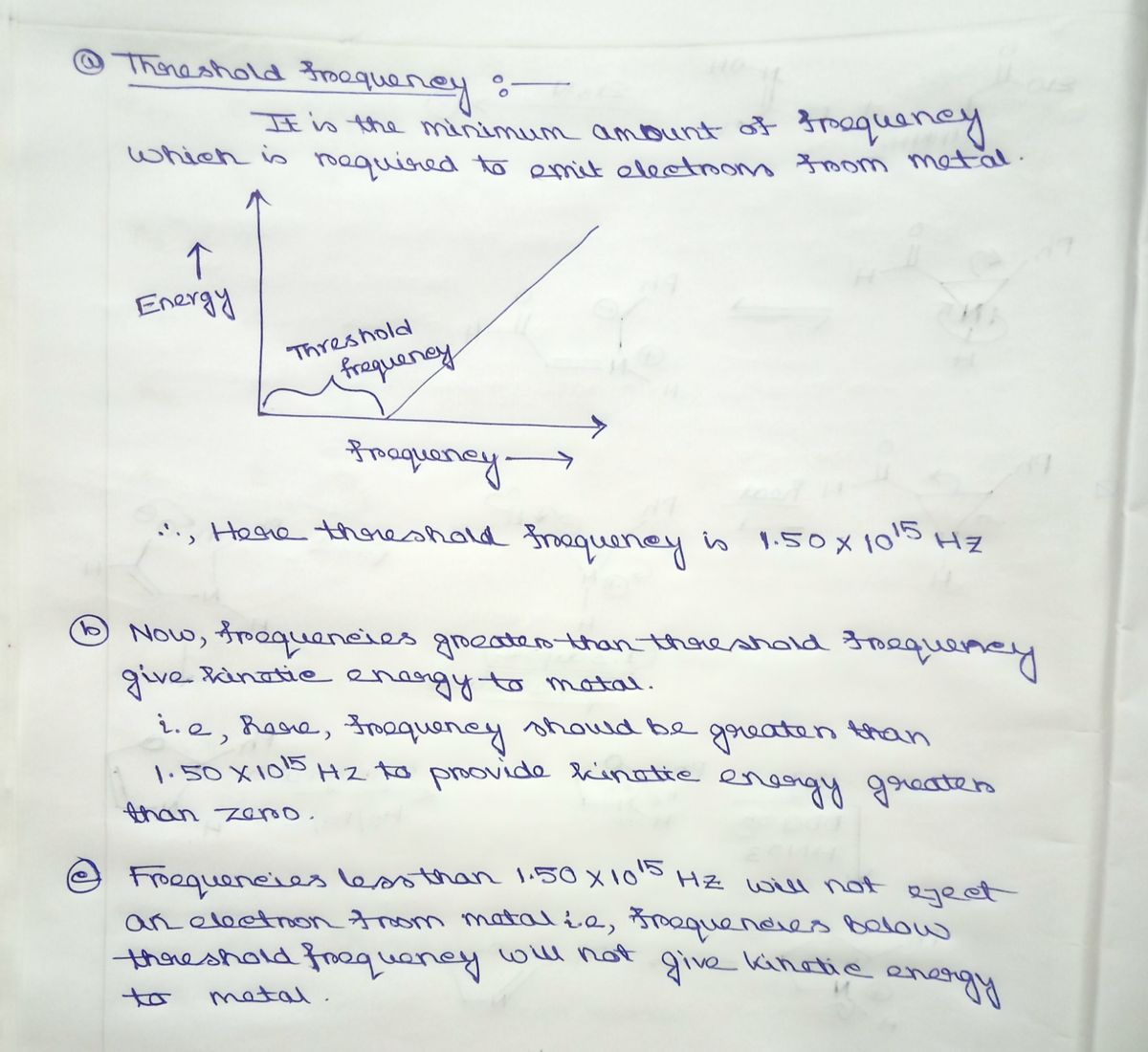2. When an electron is ejected from the surface of a metal, it is moving with a speed, therefore it has kinetic energy. Below is a graph plotting electron energy vs. light frequency for platinum. Identify the following regions on the graph and then record the answers in the spaces provided. Electron Energy vs. Light Frequency Energy (eV) 12 10 2 0 0.00 0.75 1.50 2.25 Frequency (x 10¹5 Hz) (a) What is the threshold frequency of this metal? 3.00 (b) What range of frequencies give an electron a kinetic energy greater than zero for this metal? (c) What range of frequencies do no eject an electron from this metal? (d) What is the physical relevance of the slope of this line? 3. What determines the energy of the ejected electrons?
2. When an electron is ejected from the surface of a metal, it is moving with a speed, therefore it has kinetic energy. Below is a graph plotting electron energy vs. light frequency for platinum. Identify the following regions on the graph and then record the answers in the spaces provided. Electron Energy vs. Light Frequency Energy (eV) 12 10 2 0 0.00 0.75 1.50 2.25 Frequency (x 10¹5 Hz) (a) What is the threshold frequency of this metal? 3.00 (b) What range of frequencies give an electron a kinetic energy greater than zero for this metal? (c) What range of frequencies do no eject an electron from this metal? (d) What is the physical relevance of the slope of this line? 3. What determines the energy of the ejected electrons?
Chemistry
10th Edition
ISBN:9781305957404
Author:Steven S. Zumdahl, Susan A. Zumdahl, Donald J. DeCoste
Publisher:Steven S. Zumdahl, Susan A. Zumdahl, Donald J. DeCoste
Chapter1: Chemical Foundations
Section: Chapter Questions
Problem 1RQ: Define and explain the differences between the following terms. a. law and theory b. theory and...
Related questions
Question
Question 2

Transcribed Image Text::
2
146
F2
#
3
L
2. When an electron is ejected from the surface of a metal, it is moving with a speed, therefore it
has kinetic energy. Below is a graph plotting electron energy vs. light frequency for platinum.
Identify the following regions on the graph and then record the answers in the spaces provided.
Electron Energy vs. Light Frequency
Energy (eV)
6
12
4
2
0.00 0.75
1.50
2.25
Frequency (x 10¹5 Hz)
12
(a) What is the threshold frequency of this metal?
80
F3
10
0
(b) What range of frequencies give an electron a kinetic energy greater than zero for this metal?
(c) What range of frequencies do no eject an electron from this metal?
$
(d) What is the physical relevance of the slope of this line?
4
3. What determines the energy of the ejected electrons?
R
a
F4
%
5
T
0
F5
< 6
3.00
^
C
Fó
Y
&
7
←
F7
U
00
8
Page < 3
DII
F8
1
- 0
(
9
F9
> of 4
O
)
O
A
F10
P
F11
ZOOM
<
+
Expert Solution
Step 1

Step by step
Solved in 3 steps with 3 images

Knowledge Booster
Learn more about
Need a deep-dive on the concept behind this application? Look no further. Learn more about this topic, chemistry and related others by exploring similar questions and additional content below.Recommended textbooks for you

Chemistry
Chemistry
ISBN:
9781305957404
Author:
Steven S. Zumdahl, Susan A. Zumdahl, Donald J. DeCoste
Publisher:
Cengage Learning

Chemistry
Chemistry
ISBN:
9781259911156
Author:
Raymond Chang Dr., Jason Overby Professor
Publisher:
McGraw-Hill Education

Principles of Instrumental Analysis
Chemistry
ISBN:
9781305577213
Author:
Douglas A. Skoog, F. James Holler, Stanley R. Crouch
Publisher:
Cengage Learning

Chemistry
Chemistry
ISBN:
9781305957404
Author:
Steven S. Zumdahl, Susan A. Zumdahl, Donald J. DeCoste
Publisher:
Cengage Learning

Chemistry
Chemistry
ISBN:
9781259911156
Author:
Raymond Chang Dr., Jason Overby Professor
Publisher:
McGraw-Hill Education

Principles of Instrumental Analysis
Chemistry
ISBN:
9781305577213
Author:
Douglas A. Skoog, F. James Holler, Stanley R. Crouch
Publisher:
Cengage Learning

Organic Chemistry
Chemistry
ISBN:
9780078021558
Author:
Janice Gorzynski Smith Dr.
Publisher:
McGraw-Hill Education

Chemistry: Principles and Reactions
Chemistry
ISBN:
9781305079373
Author:
William L. Masterton, Cecile N. Hurley
Publisher:
Cengage Learning

Elementary Principles of Chemical Processes, Bind…
Chemistry
ISBN:
9781118431221
Author:
Richard M. Felder, Ronald W. Rousseau, Lisa G. Bullard
Publisher:
WILEY